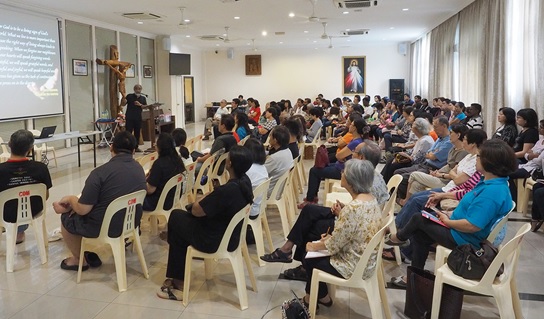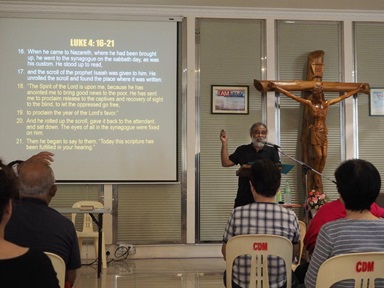Fr Fabian Dicom conducted a formation on a Reflection of the Joy of the Gospel (Evangelii Gaudium) to 97 parishioners at the Church of Divine Mercy, Penang (CDM) on the 14th July. He began by saying that Evangelii Gaudium (EG) doesn’t tell us how to read the Bible but instead how to experience the joy of the gospel. He explained that his presentation would be in four parts. Firstly, he would give his reflection of the meaning Joy. Then he would explain the Spirituality of EG and the Biblical basis of EG. This would be followed by the Theology of EG and lastly, he would summarize the four chapters of EG in relation to its Ecclesiology (the Evangelizing Church).

In his reflection of the meaning of Joy, Fr Fabian explained that he is a cradle Catholic that grew up with the perception that God, the Babysitter was always watching you. This brought an upbringing clothed with fear and a sense of not being able to measure up to God’s expectations, being unworthy and fear of punishment. This was to incite obedience and not spirituality. Hence, he explained the difference between religiosity and spirituality. He emphasized that religion has to evolve from fear based to joy based, from Churchianity to Christianity. There should be no cause and effect in what we do as God’s love is unconditional. This is the awareness we should cultivate and we should not make comparisons of our faith devotion with that of others. This awareness comes with our encounter with Jesus and this is the disposition to experience Joy. He reminded us that we need to constantly update our encounter with Jesus to let this joy grow.
In explaining the Spirituality of EG, Fr Fabian elaborated on the many things that the Holy Father, Pope Francis warns as obstacles. These include the “dark side “of secularity, a greedy economic system that produces dehumanizing poverty, a “throw away “mentality and a “worldly spirituality” that has lost its anchor in Christ and the Spirit. This causes the Church’s message to be discarded with a trend towards a forced evangelization. Fr explained that the primary reason for evangelization is the love of Jesus. So, one must heed the call of Pope Francis to renew our personal encounter with Jesus each day as no one is excluded from the joy brought by the Lord. To feel the need to speak of the beloved, point him out and make him known. This is done with prayer to implore for his grace to make Jesus the centre and have a real objective experience. This mystical experience will also allow others to be who they are and for us to live authentically in our faith. He went on to quote Henry Nouwen from his book Bread for the Journey. “What we live is more important than what we say; because the right way of living always leads us to the right way of speaking.”
In the session on the Theology of EG, Fr said that any reflection of God is theology. Theology is often relevant in its cultural context. There are many models of contextual theology. Stephen Bevans has explained six models. A guideline that may be useful is that adopted by the Conference of the Latin American and Caribbean Bishops. They use the See-Judge-Act method. See: reviews the concrete situation; Judge: is where one forms a judgement in the light of social analyses and theological reflection (based on the Scriptures and Catholic social teaching); Act: is where one decides what circumstances can and should be taken to change the situation and address the root causes.
 In the final session, Fr Fabian gave a brief summary of the four chapters of EG in the context of the See-Judge-Act guideline. Chapter 1: Basically begins with SEE on the situation of the Church. Chapter 2: SEE extended. Challenges of today’s world and the temptations faced by Pastoral workers. Chapter 3: JUDGE. Proclamation of the Gospel, the homily and issues with catechesis. Chapter 4: ACT. To include different aspects of Catholic teaching, the communal and societal repercussions of the Kerygma and dealing with the poor in society.
In the final session, Fr Fabian gave a brief summary of the four chapters of EG in the context of the See-Judge-Act guideline. Chapter 1: Basically begins with SEE on the situation of the Church. Chapter 2: SEE extended. Challenges of today’s world and the temptations faced by Pastoral workers. Chapter 3: JUDGE. Proclamation of the Gospel, the homily and issues with catechesis. Chapter 4: ACT. To include different aspects of Catholic teaching, the communal and societal repercussions of the Kerygma and dealing with the poor in society.
In conclusion, the Ecclesiology of EG makes it clear that the gospel exists to be put in practice. It gives a vision of how the Church can be opened to the world in a Church that excludes nobody from its compassion. In the image of the washing of feet, the Church ventures forward with humility and inclusiveness proclaiming the Joy of the Gospel.
In the question and answer session, Fr Fabian explained issues regarding the approaches to guiding the Youth, the rationale of role of rules and regulations given to churchgoers and the approach towards being inclusive to all in Church.
Written by
Dr Ivan Filmer
18th July, 2018.

